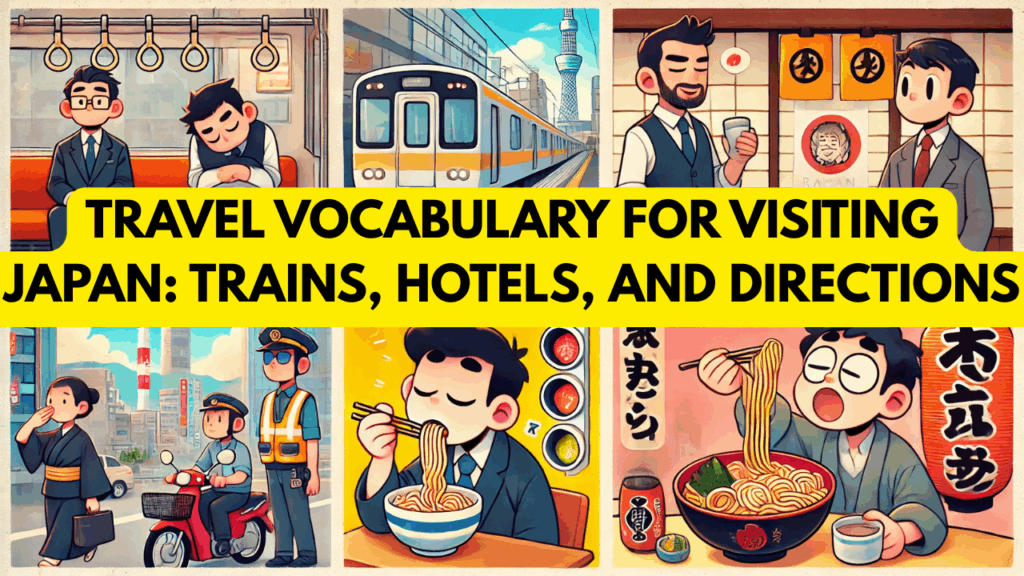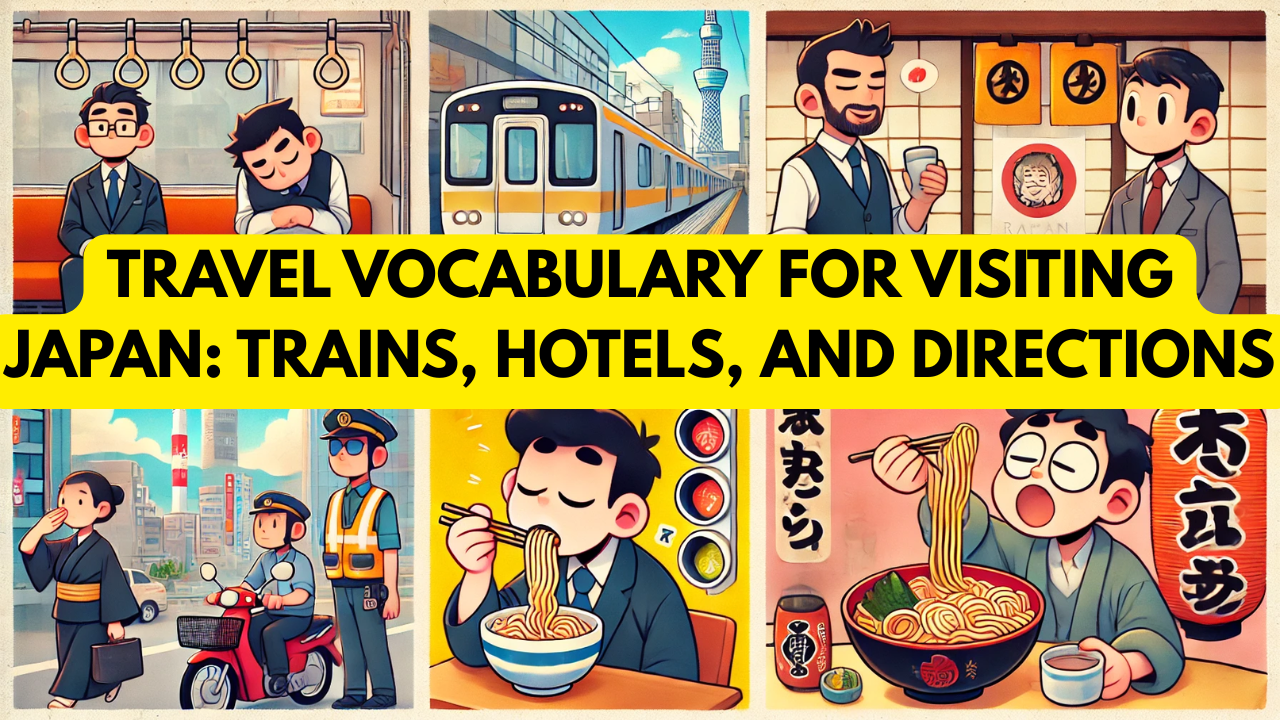
Traveling to Japan is an exciting adventure, but navigating the country becomes much easier when you know the right travel vocabulary. From buying train tickets to checking into hotels and asking for directions, these words and phrases can save you from confusion and help you enjoy your trip with confidence.
This article will guide you through the essential travel vocabulary for trains, hotels, and directions in Japan, along with examples, tables, and practical tips to make communication smoother.
Why Travel Vocabulary Matters in Japan
- Practical Use Every Day → Trains, hotels, and directions are part of nearly every trip.
- Smooth Communication → Helps avoid misunderstandings when asking locals or staff for help.
- Confidence While Traveling → Knowing what to say makes exploring stress-free.
- Cultural Respect → Using Japanese words, even a few, shows politeness and effort.
Vocabulary for Trains in Japan
Japan’s train system is famous worldwide for being punctual and extensive. To use it confidently, you’ll need key words:
Essential Train Vocabulary
- 駅 (えき / eki) – Station
- 切符 (きっぷ / kippu) – Ticket
- 新幹線 (しんかんせん / shinkansen) – Bullet train
- 快速 (かいそく / kaisoku) – Rapid train
- 各駅停車 (かくえきていしゃ / kakueki teisha) – Local train (stops at every station)
- 乗り換え (のりかえ / norikae) – Transfer
- 出口 (でぐち / deguchi) – Exit
Example Sentences
- “切符をください。” (Kippu o kudasai.) – Please give me a ticket.
- “この電車は新宿に行きますか?” (Kono densha wa Shinjuku ni ikimasu ka?) – Does this train go to Shinjuku?
Vocabulary for Hotels in Japan
Hotels and ryokan (traditional inns) often require some basic travel-related vocabulary.
Essential Hotel Vocabulary
- ホテル (hoteru) – Hotel
- 旅館 (りょかん / ryokan) – Traditional Japanese inn
- 予約 (よやく / yoyaku) – Reservation
- 部屋 (へや / heya) – Room
- フロント (furonto) – Front desk/reception
- チェックイン (chekku in) – Check-in
- チェックアウト (chekku auto) – Check-out
Example Sentences
- “予約をしています。” (Yoyaku o shite imasu.) – I have a reservation.
- “朝食は何時ですか?” (Chōshoku wa nanji desu ka?) – What time is breakfast?
Vocabulary for Asking Directions
Getting lost is part of traveling, but asking for directions in Japanese is easier when you know the basics.
Essential Directions Vocabulary
- 地図 (ちず / chizu) – Map
- 道 (みち / michi) – Road
- まっすぐ (massugu) – Straight ahead
- 右 (みぎ / migi) – Right
- 左 (ひだり / hidari) – Left
- 近い (ちかい / chikai) – Near
- 遠い (とおい / tōi) – Far
Example Sentences
- “駅はどこですか?” (Eki wa doko desu ka?) – Where is the station?
- “右に曲がってください。” (Migi ni magatte kudasai.) – Please turn right.
Practical Phrases for Travelers
| Situation | Japanese Phrase | English Meaning |
|---|---|---|
| Buying a ticket | 切符を一枚ください。 (Kippu o ichimai kudasai.) | One ticket, please. |
| Hotel check-in | チェックインをお願いします。 (Chekku in o onegaishimasu.) | I’d like to check in. |
| Asking directions | この住所はどこですか? (Kono jūsho wa doko desu ka?) | Where is this address? |
| On a train | 次はどこですか? (Tsugi wa doko desu ka?) | What’s the next stop? |
| Checking out | チェックアウトをお願いします。 (Chekku auto o onegaishimasu.) | I’d like to check out. |
Overview Table
| Category | Examples | Common Use |
|---|---|---|
| Trains | 駅 (eki), 切符 (kippu), 新幹線 (shinkansen) | Buying tickets, boarding |
| Hotels | ホテル, 予約 (yoyaku), 部屋 (heya) | Checking in/out, reservations |
| Directions | 右 (migi), 左 (hidari), 地図 (chizu) | Asking for locations |
| Travel Phrases | “駅はどこですか?” | Navigating cities |
| Politeness | ください (kudasai), お願いします (onegaishimasu) | Making requests politely |
Tips for Memorizing Travel Vocabulary
- Practice Role-Playing → Pretend to buy a ticket or check into a hotel.
- Use Flashcards with Situations → Not just words, but sentences like “Where is the station?”
- Download Transport Apps in Japanese → Seeing station names in Japanese builds recognition.
- Learn Polite Expressions → Always add kudasai or onegaishimasu for politeness.
- Connect Words to Experiences → Use the words when you actually travel, reinforcing memory.
Common Mistakes Travelers Make
| Mistake | Why It Happens | Fix |
|---|---|---|
| Confusing exits | Stations have multiple exits | Learn 出口 (deguchi) with landmarks |
| Forgetting polite words | Sounding too direct | Always add onegaishimasu |
| Mixing up left/right | Fast conversations | Practice with hand gestures |
| Not knowing local train vs express | Missing stops | Check 各駅停車 vs 快速 |
| Relying only on English | Not always understood | Learn at least basic Japanese words |
Final Thoughts
Traveling in Japan becomes much easier when you know the right train, hotel, and direction vocabulary. Instead of relying only on English or translation apps, learning these simple yet essential words will help you navigate confidently, connect with locals, and enjoy a smoother journey.
By practicing polite phrases, memorizing key vocabulary, and role-playing real travel scenarios, you’ll gain the confidence to handle any situation—from buying shinkansen tickets to finding your hotel after a long day of exploring.
3 Best One-Line FAQs
Q1. What’s the most important travel word in Japan?
A. “駅 (Eki)” meaning station, since trains are central to Japanese travel.
Q2. How do I politely ask for directions in Japan?
A. Use “〜はどこですか?” (… wa doko desu ka?) after the place name.
Q3. Do Japanese hotels understand English?
A. Some do, but knowing simple Japanese travel vocabulary helps a lot.

